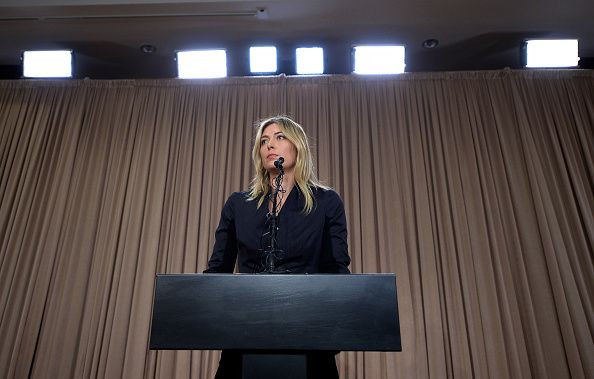What Is Meldonium? Maria Sharapova Failed Australian Open Drug Test With Banned Substance, Tennis Star Says

UPDATE: 10:18 p.m. EST -- Sports apparel giant Nike has suspended its relationship with tennis star Maria Sharapova, following her disclosure Monday that she tested positive for using a banned drug, CNBC reported.
BREAKING: Nike suspends relationship with Maria Sharapova after the tennis star said she failed a drug test. pic.twitter.com/F262QdNcs7
— CNBC Now (@CNBCnow) March 8, 2016
Original story:
The tennis world was buzzing Monday after Maria Sharapova announced in a press conference she failed a drug test at January's Australian Open. The 28-year-old former world champ said she'd tested positive for the drug meldonium at the competition.
Sharapova, winner of five Grand Slams in her career, said she had been taking the drug since 2006 for health issues — ranging from getting the flu often, irregular EKG results and indications of diabetes — and was not aware it had been added to the World Anti Doping Agency's list of banned substances at the beginning of this year. She said she had received a letter March 2 from the International Tennis Federation (ITF) and did not yet know what disciplinary action she would face. The ITF confirmed in a statement that Sharapova had failed a test and that she would be provisionally suspended until the case had been finalized. The consequences could range widely, from a multi-year ban to minimal action, depending on if it's found to be an honest mistake or purposeful cheating.
"I made a huge mistake and I let my fans down, I let the sport down that I've been playing since the age of 4 that I love so deeply," Sharapova, currently ranked No. 7 in the world, said, via ITV News.
A 2015 paper written by authors at the Center for Preventive Doping Research and the European Monitoring Center for Emerging Doping Agents, described the "anti-ischemic drug" as one that could perhaps demonstrate "an increase in endurance performance of athletes, improved rehabilitation after exercise, protection against stress, and enhanced activations of central nervous system (CNS) functions."
Maria Sharapova has revealed she failed a drug test at the Australian Open. Result from banned medication. #7News https://t.co/ewECtyKvf9
— 7 News Sydney (@7NewsSydney) March 7, 2016
Sharapova lost in the final eight of the 2016 Australian Open to world No. 1 Serena Williams, who went on to a shocking loss to Angelique Kerber in the final. Sharapova is one of the most recognizable athletes in the world and was the top-earning female athlete in 2015 for the 11th straight year, according to Forbes rankings. She made an estimated $29.7 million, the lion's share of which came from deals with sponsors like Nike, Head, Porsche and Tag Heuer.
While Sharapova said she was not aware the substance had been banned as of 2016, the Russian star did admit fault.
"I failed the test and take full responsibility for that," the Russian tennis great said at the press conference in Los Angeles.
The World Anti-Doping Agency lists meldonium as a metabolic modulator on its 2016 banned substance list. But it could be used for a multitude of reasons, including helping with blood flow problems. It's manufactured in Latvia and is popular for fighting heart disease in former Soviet nations, according to Bloomberg, which reported that two Ukrainian biathletes and a Russian cyclist had already tested positive for the drug since it was banned in January. World indoor 1500-meter champion Abeba Aregawi was also suspended about a week ago, reportedly for taking meldonium.
But while the drug can help with heart disease and vascular issues, it was banned because it can also increase endurance and aerobic capabilities in athletes, and there was evidence that it had been abused for that purpose.
Meldonium improves blood-flow, banned since 01/16 amid suspicion abused by endurance athletes. Plenty of evidence already that's accurate
— Paul Kelso (@pkelso) March 7, 2016
Sharapova admits taking meldonium for 10 years on medical advice. Put another way, for a decade she's taken a substance now considered a PED
— Paul Kelso (@pkelso) March 7, 2016
© Copyright IBTimes 2024. All rights reserved.






















